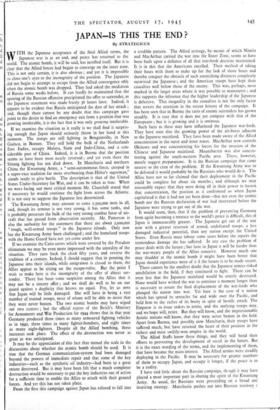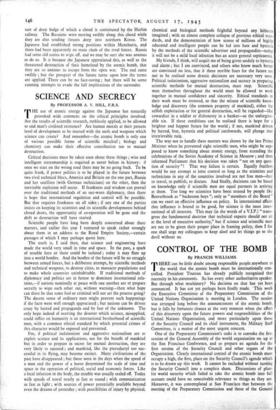JAPAN IS THIS THE END ?
By STRATEG ICUS
WITH the Japanese acceptance of the final Allied terms, the Japanese war is at an end, and peace has returned to the world. The atomic bomb, it will be said, has justified itself. But it is
clear that the Allied forces had begun to converge on the inner zone. This is not only certain, it is also obvious ; and yet it is impossible to close one's eyes to the incongruity of the position. The Japanese did not begin to attempt to escape from the Allied convergence only when the atomic bomb was dropped. They had asked the mediation of Russia some weeks before. It can hardly be maintained that the opening of the Russian offensive precipitated the offer to surrender, as the Japanese statement was made barely 36 hours later. Indeed, it appears to be evident that Russia anticipated the date of her attack ; and, though there cannot be any doubt that this campaign gave point to the desire to find an emergency exit from a position that was
growing intolerable, it is the fact that it was only growing intolerable.
If we examine the situation as it really is we shall find it surpris- ing enough that Japan should seriously throw in her hand at this moment. The troops are still fighting in Bougainville, in New Guinea, in Borneo. They still hold the bulk of the Netherlands East Indies, occupy Malaya, Siam and Indo-China, and a con- siderable part of China. Indeed, it is in Burma that the position
seems to have been most nearly reversed ; and yet even there the Sittang fighting has not died down. In Manchuria and northern
China the Kwantung Army, a " semi-autonomous force, • steeped in a super-race tradition far more overbearing than Hitler's superman," stands ready to give battle. The description is that of the United States Under-Secretary for War, and it can be taken as true. When we were facing our most critical moment Mr. Churchill stated that if necessary he would continue the fight from across the Atlantic. It is not easy to suppose the Japanese less determined.
The Kwantung Army may amount to some 1,5oo,000 men in all, and, though its armour is not very strong, it has some tanks, and it probably possesses the bulk of the very strong combat force of air- craft that has passed from observation recently. Mr. Patterson is also the authority for the statement that there are about 2,000,000 " tough, well-armed troops " in the Japanese islands. Only now has the Kwantung Army been challenged ; and the homeland troops with the Home Guard have not yet come under fire.
If we examine the Cairo terms which were covered by the Potsdam ultimatum we may be even more impressed with the unreality of the situation. They turn back the clock fifty years, and reverse the tradition of a century. Indeed, I should suggest that in penning the Japanese into their islands, while emigration is closed to them, the Allies appear to be sitting on the escape-valve. But the point I wish to make here is the incongruity of the offer of abject sur- render. There has been some suspicion among the Allies that it may not be a sincere offer ; and we shall do well to be on our guard against a duplicity that knows no equal. For, let us note that Japan will be little damaged. She will have in being a vast number of trained troops, most of whom will be able to insist that
they were never beaten. The two atomic bombs may have wiped out two centres ; but the official report of the Reich's Ministry
for Armaments and War Production for 1944 shows that in that year Germany produced three times as many armoured fighting vehicles as in 1942, three times as many fighter-bombers, and eight times as many night-fighters. Despite all the Allied bombing, these increases took place. The effect of the ,destruction was never as great as was anticipated.
It may be the appreciation of this fact that turned the scale in the discussions about whether the atomic bomb should be used. It is true that the German communication-system had been damaged beyond the powers of immediate repair and that some of the key industries—such as the synthetic oil industry—had been to a great extent destroyed. But it may have been felt that a much completer destruction would be necessary to put the key industries out of action for a sufficient time to enable the Allies to attack with their ground forces. And yet this has not taken place.
From the first this campaign against Japan has refused to fall into a credible pattern. The Allied strategy, by means of which Nimitz and MacArthur carried the war into the Inner Zone, seems to have been built upon a defiance of all that text-book doctrine maintained.
It is in this that the Americans excelled. Their method of taking their bases with them to make up for the lack of shore bases and thereby conquer the obstacle of such astonishing distances completely outwitted the Japanese ; and the American troops have kept their casualties well below those of the enemy. This was, perhaps, most marked in the larger areas where it was possible to manoeuvre ; and this supports the inference that the higher leadership of the Japanese is defective. This inequality in the casualties is not the only factor that arrests the attention in the recent history of the campaign. It has been seen that in Burma the ratio of enemy surrenders has grown steadily. It is true that it does not yet compare with that of the Europeans ; but it is growing and it is ominous.
Such facts as these may have influenced the Japanese war-lords. They have seen also the growing power of the air-bases adjacent to the Japanese mainland. They have been made aware of the Allied concentration in the outer and inner zones. MacArthur now controls Okinawa and was concentrating his forces for the invasion of the Chinese and Japanese mainland. Mountbatten was also concen- trating against the south-western Pacific area. These, however, merely suggest preparations. It is the Russian campaign that came nearest to the crux of the problem. If the Kwantung Army was to be defeated it would probably be the Russians who would do it. The Allies have not so far claimed that their deployment in the Pacific could be complete for about six months ; and although we may reasonably expect that they were doing all in their power to hasten that concentration, the position as it confronted us when Japan capitulated is that it had not yet been done—that not even the atomic bomb nor the Russian declaration of war had intervened before the Japanese were trying to get out of the war.
It would seem, then, that if the problem of preventing Germany from again becoming a menace to the world's peace is difficult, this of Japan is immeasurably greater. The Japanese get out of the war now with a greater reservoir of armed, undefeated troops, a less damaged industrial potential, than any nation except the United States. Even Russia must labour some years before she repairs the tremendous damage she has suffered. In any case the problem of peace deals with the future ; but here in Japan it will be harder than the war-weary people of the Allies conceive. However much one may shudder at the atomic bomb it might have been better that Japan should experience more of it if the future is to be made secure.
There cannot be the smallest doubt that the Japanese armies risked annihilation in the field, if they continued to fight. There can be even less that the Japanese mainland would be utterly destroyed. None would have wished the war to continue a moment longer than is necessary to assure the final displacement of the war-lords who plunged the nation into war. Yet here is the case of a nation which has spread its tentacles far and wide over the Pacific, and held firm to the riches of its booty in spite of hostile attack. The Emperor is to issue orders to retire, and the outlying troops may, and we hope will, retire. But they will know, and the impressionable Asiatic nations will know, that they were never beaten in the field. Apart from Burma, and possibly now Manchuria, their troops have suffered much, but have retained the heart of their position in the richest and most swiftly-won empire in the world.
The Allied Staffs know these things, and they will bend their efforts to preventing the development of recoil in the future. But it is the exact wording of the terms, and the implementing of them, that have become the main interest. The Allied armies were steadily deploying in the Pacific. It may be necessary for greater numbers of them to occupy Japan, and occupy it longer, if the peace is to be a reality.
I have said little about the Russian campaign, though it may have played a most important part in abating the spirit of the Kwantung Army. As usual, tht Russians were proceeding on a broad and inspiring strategy. Manchuria pushes out into Russian territory sort of deep bulge of which a chord is constituted by the Harbin railway. The Russians were moving swiftly along this chord while they are also sending thrusts deep into northern Korea. The Japanese had established strong positions within Manchuria, and there had been apparently no main clash of the rival forces. Russia had some old scores to wipe off, and we may be sure she was anxious to do so. It is because the Japanese appreciated this, as well as the threatened destruction of their homeland by the atomic bomb, that they are so anxious to escape from the open war. The end came swiftly ; but the prospect of the future turns upon how the terms are applied. There can be no 'face-saving ; but there will be some cunning attempts to evade the full implications of the surrender.



























 Previous page
Previous page